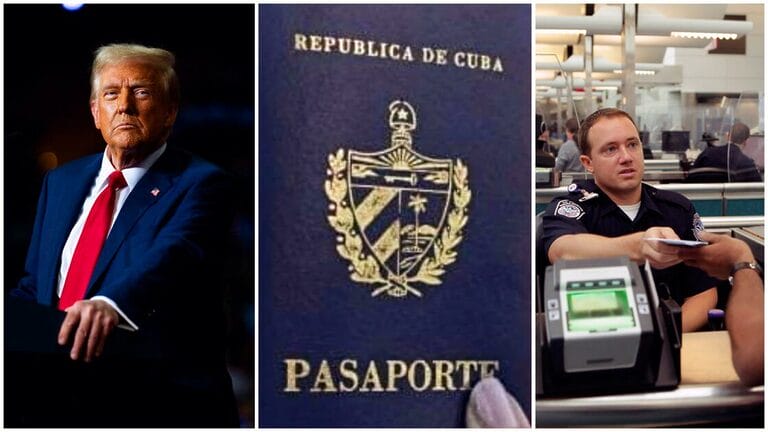El presidente Trump planea restablecer y ampliar las restricciones de viaje a Estados Unidos para los ciudadanos de un grupo de países, incluida Cuba. Así lo ha publicado el diario The New York Times.
El gobierno de Donald Trump está ultimando un nuevo veto migratorio que prohibiría la entrada de ciudadanos de ciertos países a Estados Unidos. La medida, según fuentes cercanas al proceso, sería más amplia que las implementadas en su primer mandato.
Lista de países afectados
A draft under discussion within the Executive proposes a "red list" of nations whose citizens would be absolutely banned. According to an official, the list would mainly include countries affected by Trump's previous restrictions, such as Cuba, Iran, Libya, North Korea, Somalia, Sudan, Syria, Venezuela, and Yemen.
Additionally, the document suggests adding Afghanistan to this group. Shawn VanDiver, president of AfghanEvac, an organization that helps resettle Afghans who collaborated with U.S. forces, stated that he had been informed that citizens of Afghanistan would face a total entry ban.
The proposal also includes an "orange list," with countries whose citizens would have restricted access to certain types of visas, such as business visas, but not to residence or tourist permits. In this case, applicants would face in-person interviews and more rigorous processes.
Pakistan could remain at this level or in the strictest category, according to sources close to the process. A third "yellow list" would give certain countries 60 days to correct security or cooperation deficiencies with the United States before being moved to one of the other categories.
Impact on those who already have visas
It is still unclear whether the measure will affect those who already have approved visas or if these will be canceled. In the case of Afghanistan, there are about 200,000 people inside the country and 51,000 outside, mainly in Pakistan, waiting for their resettlement in the United States. VanDiver warned that many of them already have housing secured and are ready to travel.
It is the most reviewed population that has ever existed," he said. "The process they have gone through is incredibly rigorous.
Veterans of the war in Afghanistan who voted for Trump have expressed their discontent with this possible ban. "This is not what I voted for," some have stated, according to VanDiver. "We were supposed to bring our war allies home, and now they are being betrayed.
The executive order underway
On January 20, Trump signed an executive order instructing the Department of State to identify countries that do not meet security standards and share information about travelers. The final list must be submitted within two weeks and is prepared in collaboration with the Departments of Justice and Homeland Security, as well as the Office of the Director of National Intelligence.
The State Department has not confirmed details about the list, but stated in a release that it follows the presidential order to "protect the nation and its citizens, maintaining the highest standards of security and immigration control.
Under the direction of the Office of Consular Affairs, embassies and security experts are reviewing the data from each country to determine their inclusion on the lists. Some argue that certain restrictions could affect key diplomatic relations.
Un retorno a las políticas de su primer mandato
La política de Trump sobre restricciones migratorias comenzó en 2015 con su propuesta de prohibir la entrada de musulmanes a Estados Unidos. En 2017, al asumir la presidencia, firmó la primera versión de su veto migratorio, que fue modificada varias veces tras enfrentar desafíos legales.
Las primeras versiones del veto, enfocadas en países de mayoría musulmana, fueron bloqueadas por tribunales. Sin embargo, una versión revisada logró la aprobación de la Corte Suprema.
Cuando Joe Biden asumió la presidencia en 2021, revocó estas prohibiciones de inmediato, calificándolas de «simplemente erróneas» y «una mancha en nuestra conciencia nacional». Argumentó que las restricciones perjudicaban la seguridad nacional al dañar alianzas estratégicas.
Ahora, con su regreso al poder, Trump justifica la reinstauración de estas medidas como una forma de proteger a Estados Unidos de amenazas externas, incluyendo posibles ataques terroristas y el ingreso de individuos con ideologías extremistas.
Continue reading in Directory News
Follow our channels of WhatsApp, Telegram y Facebook.
